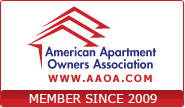Tristan is the Executive Vice President and shareholder with the law firm of Petrie+Pettit and focuses his practice in the area of landlord-tenant law representing landlords and property management companies throughout Wisconsin.
Call us: (414) 276-2850
Landlords Can Be Liable for the Discriminatory Acts of Their Tenants
Posted by Tristan R. Pettit, Esq. in Caselaw, Fair Housing / Discrimination, Protected Classes, Landlord Liability / Comments
Perhaps one of the most important cases to be published in 2018 affecting landlord-tenant law was the Seventh Circuit Court of Appeals case of Wetzel v. Glen St. Andrew Living Community, LLC, 2018 WI 4057365 (7th Cir. Aug 27, 2018). In the Wetzel case the Seventh Circuit (which includes Wisconsin) held that a landlord may be liable under the Fair Housing Act (FHA) for failing to protect a tenant from known, discriminatory harassment by other tenants.
Within months of arriving at Glen St. Andrew, Wetzel, who was a lesbian, was physically and verbally abused by other tenants. On multiple occasions Wetzel asked staff members to intervene and protect her. Rather than doing that, staff actually appeared to punish Wetzel by limiting where she was allowed to go in the facility.
Glen St. Andrews own Rules and Regulations document allowed it to evict any tenant who “engages in acts or omissions that constitute a direct threat to the health and safety of other individuals.” Rather than enforce its rules against the tenants harassing Wetzel, staff told her not to worry about the harassment, dismissed the abuse as accidental, and denied Wetzel’s version of the facts, and even called her a liar.
The Court wrote that had the landlord done nothing but merely listen to the tenant, that its holding might have been more limited, however in this case Glen St. Andrew took affirmative steps to retaliate against Wetzel for complaining.
The Wetzel court interpreted the FHA broadly and ruled that not only does the FHA create liability for a landlord who intentionally discriminates against a tenant based on their protected class status; the FHA also creates liability against a landlord that has actual notice of tenant-on-tenant harassment based on the tenant's membership in a protected class, yet chooses not to take any reasonable steps within its control to stop the harassment.
While the landlord's actions in Wetzel were pretty egregious and faced with a different set of facts the Court may have held differently, the key takeaway from this case is that if landlords fail to curtail discriminatory conduct by tenants on other tenants, when it is possible for for the landlord to do so, the landlord may end up having direct liability under the FHA.




